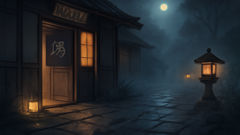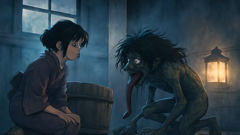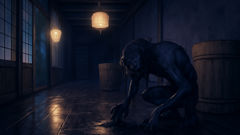Introduction
In the quiet, mist-wrapped villages of medieval Japan, tales blossomed like moss between cobblestones, whispered from one sliding paper wall to the next. Among them, none sent such a peculiar shiver down the spine as the story of the Akaname—the yokai with a taste for filth, a spirit rarely seen but never forgotten. Children were told to clean their corners and scrub the bathhouse tiles, not just for the sake of pride or health, but to keep the Akaname at bay. It wasn’t fear alone that gave this yokai its power; it was the strange wisdom stitched into its long, sticky tongue, the way it haunted only the places forgotten by diligence and respect. Long before electricity or running water, when the moon was the only lamp above tiled roofs and the scent of pine incense clung to the air, a family of innkeepers in the bustling mountain town of Tsuchizawa learned firsthand the curious blessings and quiet curses brought by this spirit. Through their struggle, the true meaning of cleanliness—the kind that starts in the soul—would reveal itself, winding through shadowed corridors and echoing in the hush of midnight. This is their story, and the story of the Akaname, the Filth Licker, whose presence still flickers in the memory of every darkened bathhouse.
The Arrival at Tsuchizawa
The mountain village of Tsuchizawa thrived on stories, its crooked streets coiling between shrines and teahouses, and every doorway framed by the fragrance of cedar. It was said that travelers came for the hot springs but stayed for the inn at the heart of the village: Kikuya. Run by the Nakagawa family for generations, Kikuya had earned a reputation as spotless and orderly, a place where bathwater always steamed, tatami mats smelled of new straw, and even the shadows seemed dusted by diligent hands.

But in the year when late frosts bit the plum trees and the river ran higher than memory, a subtle shift crept into the Nakagawa household. Junichiro, the current innkeeper, prided himself on tradition—he polished the wooden thresholds himself, guided his children in the art of rolling futons, and instructed his wife, Hisayo, on keeping the bathhouse pristine. Their eldest daughter, Aiko, possessed a keen sense of duty, her hands raw from wringing cloths and her eyes sharp for cobwebs. Still, beneath the family’s polished routine, fatigue began to spread like mildew after a rainy season.
The influx of travelers this spring had overwhelmed them. With rooms booked beyond capacity and every meal prepared in haste, corners were cut. The bathhouse—once the pride of the inn—became an afterthought, scrubbed hastily or not at all. Its wooden tubs lost their shine. Scum clung to the tile grout. Water stains crept up the walls. Yet, exhausted and preoccupied, no one noticed.
The first hint of change came with the night air. Aiko awoke to a peculiar scent drifting from the bathhouse—a mix of sour water and something metallic. She dismissed it, believing it a trick of the wind. But then, guests began to whisper: strange sounds in the dark, a soft slurping echoing behind the paper walls, and the feeling that someone—or something—was watching as they bathed.
Junichiro scoffed at the rumors. “People let their imaginations run wild,” he grumbled, waving off complaints. But the murmurs grew. One guest, a traveling monk named Shunkei, took it upon himself to investigate. He spent a night sitting cross-legged outside the bathhouse, clutching his prayer beads. At dawn, his face was ashen. He reported nothing out of place, except for odd footprints—webbed and slimy—leading from the bathhouse door and vanishing into the shadows.
The family was unnerved. Aiko, tired as she was, could not ignore her sense that something lingered beyond the shoji screens at night. She began to clean with renewed vigor, but it seemed no matter how she scrubbed, grime returned by morning, and the peculiar slurping sound only grew louder. It was Hisayo, ever practical, who recalled a tale from her own childhood. "The Akaname," she whispered one night, voice trembling. "The Filth Licker. When a house falls into neglect, the yokai comes—drawn to what’s left behind."
At first, Junichiro laughed, but as the days passed and the complaints increased, even his resolve began to crack. Shadows seemed to ripple in the lamplight. The bathhouse’s once-clear water was always cloudy. The family debated what to do, but their pride and exhaustion kept them from seeking help. Instead, they tried to ignore the problem, hoping it would fade with time.
But the Akaname, once drawn, is not so easily banished. Night after night, the presence grew stronger—shuffling sounds, the scrape of claws on wood, and always that tongue, rasping and wet, licking away at the filth that gathered in the neglected corners of Kikuya’s once-glorious bathhouse.
The Whispering Tongue
As the days slipped into sultry midsummer, Kikuya’s bathhouse became a place of unspoken dread. Guests now hesitated to use it after sunset. Junichiro, refusing to let superstition undermine his reputation, ordered his family to redouble their cleaning efforts. Still, each morning brought fresh stains and an inexplicable stickiness clinging to the floors. The Nakagawa family was weary, tempers fraying like old tatami.

One sweltering night, with lanterns guttering against the breeze, Aiko lingered near the bathhouse long after the guests had retired. The air was thick with anticipation and an earthy rot she couldn’t place. Clutching a rag and bucket, she slipped inside, determined to chase away her fears with soap and water.
She knelt beside the largest tub, scrubbing at the stubborn mold that clung to its rim. Her hands moved mechanically, mind replaying her mother’s warning about the Akaname. Suddenly, a chill licked the back of her neck. The room was silent—too silent—broken only by her own ragged breathing. Then came the sound: a slurp, wet and slow, echoing from the darkest corner.
Aiko froze, heart pounding, as a figure materialized from shadow. It was gaunt and childlike, skin mottled green and grey, its hair stringy and wet. But most disturbing of all was its tongue—grotesquely long and glistening, snaking over the tiles. The creature crouched, eyes gleaming with a mischievous intelligence, and began to lap at a puddle of grime.
She stifled a gasp. The yokai paid her no mind. Instead, it whispered—not with words, but with the sound of its tongue working methodically, as if imparting some secret only the truly attentive could decipher. Aiko watched, fear giving way to fascination. The Akaname was not attacking or threatening; it was merely cleaning what she had left undone, savoring every bit of filth.
As quickly as it appeared, the creature slunk away, leaving the floor polished where it had licked. Aiko remained motionless until the sun’s first rays crept across the window. She told no one, though her eyes now darted to every shadow. She wondered if the yokai’s work was a warning, or perhaps a lesson.
Over the following nights, Aiko repeated her vigil, determined to learn more. Sometimes she glimpsed the Akaname’s reflection in a bucket of water or caught its silhouette against the misted glass. Each time, she found herself less afraid and more ashamed. The creature never touched clean surfaces. It only came where neglect had taken root.
Aiko’s siblings began to notice her strange behavior. Her brother Haruto, brash and skeptical, decided to spy on her. One night, together they witnessed the Akaname at work. Haruto tried to chase it away, but his foot slipped on a patch of slime, sending him tumbling. The yokai paused, its lips curling in what almost seemed like a grin, before melting back into darkness.
From that night, the family could no longer pretend ignorance. The Akaname had chosen them not as victims, but as partners in its peculiar crusade. It did not punish; it revealed. Where pride and haste had made them blind, the filth licker showed what had been forgotten. Gradually, a sense of humility began to grow—first in Aiko, then in her siblings, and finally in Junichiro himself.
They cleaned not out of fear, but respect. And in those rare moments when a spot was missed, they felt a presence—gentle, almost grateful—working alongside them. The Akaname had become both their reminder and their unseen ally.
Conclusion
In time, the Kikuya inn regained its reputation—not just for cleanliness, but for warmth and humility. Guests no longer whispered of strange sounds in the night; instead, they marveled at how every corner gleamed, how the air felt lighter and even the oldest timbers seemed refreshed. The Nakagawa family kept their secret, understanding at last that true respect for one’s home came not from rigid pride, but from attentive care and shared effort. Occasionally, when moonlight slanted across the polished wood or a shadow flickered near a freshly scrubbed tile, Aiko thought she saw a thin, playful tongue darting at the edge of vision. She would pause, bow her head in silent thanks, and remember: the Akaname was never a curse, but a gentle teacher—one who revealed what was hidden not just beneath dirt, but within hearts. And so, in every tidy home and every whispered folktale, the lesson of the Filth Licker endures—quietly urging us to see beauty in diligence, humility in imperfection, and wisdom in the shadows we choose to clean.













